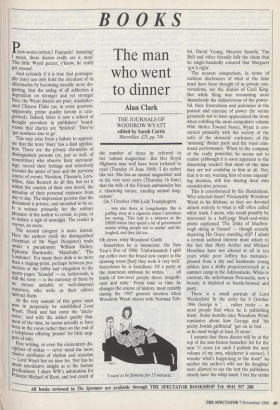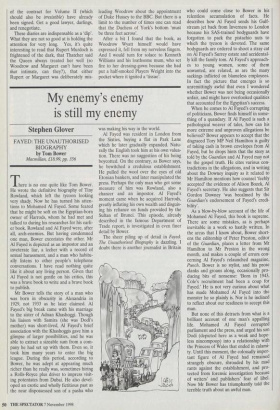BOOKS
The man who went to dinner
Alan Clark
THE JOURNALS OF WOODROW WYATT edited by Sarah Curtis Macmillan, £25, pp. 748 Phew-wotta-torture! Fantastic! Amazing! I mean, these diaries really are it, man! This little Wyatt geezer, y'know, he really got around.
And certainly if it is true that pornogra- phy (say) can only hold the attention of its aficionados by becoming steadily more dis- gusting, that the sating of all addiction is dependent on stronger and yet stronger fixes, the Wyatt diaries are pure, unadulter- ated Chinese Flake (as, in some quarters, apparently, prime quality heroin is cate- gorised). Indeed, there is now a school of thought prevalent in publishers' board- rooms that diaries are Tmished'. They've got nowhere else to go'. This may arise from a failure to appreci- ate that the term 'diary' has a dual applica- tion There are the private chronicles of distinguished persons (or, just as well, of nonentities) who observe their surround- ings, record their feelings and selectively recount the antics of men and the perverse course of events. Nicolson, Channon, Lees- Milne, Alan Bennett do all this, but set it Within the context of their own mood, the minutiae of their personal existence from day to day. The impression persists that the document is private, and intended to be so. It is written primarily for the solitary pleasure of the author to revisit; to pine, or to induce a sigh of nostalgia. The reader is voyeur, no more.
The second category is more instant. Here the authors (with the distinguished exception of Mr Nigel Dempster) trade under a pseudonym: William Hickey, Ephraim Hardcastle, 'Mandrake', 'The Londoner'. For many their desk is no more than a staging-point, perhaps between pro- motion or the lobby and relegation to the sPoris pages. 'Scandal' — as, ludicrously, is still the term — is the currency of these by no means amiable or well-disposed reporters, who write as their editors instruct them.
At the very summit of this genre must now in perpetuity be established Lord Wyatt. Thick and fast come the 'disclo- sures', and with the added quality that, most of the time, he seems actually to have been in the room rather than on the end of a telephone offering 'ponies' for little snip- pets of info.
. Fine writing, or even the elementary dis- ciplines of syntax — never mind the more elusive attributes of rhythm and scansion ---- Lord Wyatt has no time for. Nor has he much speculative insight as to the human predicament. I share WW's admiration for Princess Michael of Kent, and lost count of the number of times he referred to her 'animal magnetism'. But Her Royal Highness may well have been irritated to read (Tuesday 14 June 1988) 'I do rather like her. She has an animal magnetism' and in the very next entry (Thursday 16 June) that the wife of the French ambassador has a 'charming nature, exuding animal mag- netism'.
On 5 October 1986 Lady Trumpington . . . was also there at Longchamps. She is puffing away at a cigarette when I introduce her saying, 'This lady is a minister at the DHSS where they spend a lot of government money telling people not to smoke' and she laughed, and they did too.
Oh clever, witty Woodrow! Gosh!
Sometimes he is insouciant. On New Year's Eve of 1988: 'Unfortunately I spilt my coffee over the brand new carpet in the drawing room [but] they took it very well.' Sometimes he is fastidious. Of a party at the American embassy he writes, `. . all kinds of low-level people there; insignifi- cant and tatty.' From time to time he changes the course of history, most notably during the 1987 general election when Woodrow Wyatt shares with Norman Teb- 'I want to be famous for 15 minuets.' bit, David Young, Maurice Saatchi, Tim Bell and other friendly folk the claim that he single-handedly ensured that Margaret `got it right'.
The nearest comparison, in terms of reckless disclosures of what at the time must have been thought of as private con- versations, are the diaries of Cecil King. But while King was recounting most shamelessly the indiscretions of the power- ful, their frustrations and jealousies in the pursuit and exercise of power (he seems genuinely not to have appreciated the irony when entitling the most compulsive volume With Malice Toward None), Wyatt is con- cerned primarily with the society of the café; of the stewards' enclosure; of the 'amusing' dinner party and the royal com- mand performance. When in the company of the really powerful, he seems not to realise (although it is soon apparent to the discerning reader) that most of the time they are not confiding in him at all. Not, that is to say, warning him of some impend- ing decision, still less sharing their own considerative process.
This is corroborated by the illustrations. Who selected them? Presumably Woodrow Wyatt in his lifetime, as they are devoted almost entirely to what is still often called white trash. I mean, who could possibly be interested in a half-page black-and-white photo captioned 'The Duke of Marlbor- ough skiing at Gstaad' — though actually depicting His Grace standing still? I admit a certain archival interest must attach to the fact that Mary Archer and Michael Heseltine have not altered at all in ten years while poor Jeffrey has metamor- phosed from a shy and handsome young athlete into a shifty proprietor/coach at a summer camp in the Adirondacks. While in contrast, the unfortunate Petronella, now a beauty, is depicted as beetle-browed and pasty.
There is a small portrait of Lord Weidenfeld. In the entry for 8 October 1986 George is `. . rather tricky — as most people find when he is publishing them'. Some months later Woodrow Wyatt ruminates about how George and 'his pretty Jewish girlfriend' get on in bed . . . as he must weigh at least 20 stone'.
I assume that these diaries will be at the top of the non-fiction bestseller list for the next 11 years (or until I publish the next volume of my own, whichever is sooner). I wonder what's happening to the dosh? As neither the author's wife nor his daughter were allowed to see the text the publishers clearly have the whip hand. I bet the terms of the contract for Volume II (which should also be irresistible) have already been signed. Get a good lawyer, darlings, and renegotiate.
These diaries are indispensable as a 'dip'. What they are not so good at is holding the attention for very long. Yes, it's quite interesting to read that Rupert Murdoch is frightened of the dark, that Thatcher said the Queen always treated her well (so Woodrow and Margaret can't have been that intimate, can they?), that either Rupert or Margaret was deliberately mis- leading Woodrow about the appointment of Duke Hussey to the BBC. But there is a limit to the number of times one can read that the Duchess of York's bottom 'must be three feet across'.
After a bit I found that the book, as Woodrow Wyatt himself would have expressed it, fell from my nerveless fingers. And I would turn for solace to Kenneth Williams and his loathsome mum, who set fire to her dressing-gown because she had put a half-smoked Players Weight into the pocket where it ignited a 'tissue'.



















































































 Previous page
Previous page